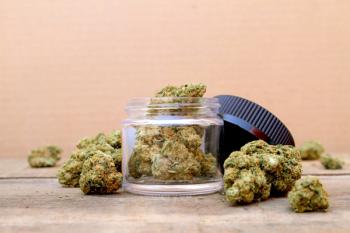
International Cannabis: A Keynote Preview from the Cannabis Science Conference West

Scheril Murray Powell, Esq., shares a preview of her talk “International Cannabis: Trade and Supply Chain Considerations for a Global Cannabis Brand.”
Cannabis Science Conference West, taking place May 18-20 in Long Beach, California, is quickly approaching. The two-day agenda is packed with exciting speakers from around the country as well as many prominent women moving the industry forward. In honor of Women’s History Month, we connected with Keynote speaker Scheril Murray Powell,Esq., to learn more about her talk “International Cannabis: Trade and Supply Chain Considerations for a Global Cannabis Brand.” Powell is an agricultural, cannabis, and dietary supplement attorney at Doumar, Allsworth, Laystrom, Voigt, Adair, and Dishowitz LLP. She is also a hemp farmer and the Chair of the Diversity, Equity, and Inclusion Sub-Committee of the ASTM D37 Committee. Join us for a sneak peek into Powell’s cannabis journey and plans for her talk on Friday, May 20th from 1:00-2:00 pm.
What inspired you to present on this topic?
Scheril Murray Powell, Esq:I have been presenting at the Cannabis Scientific Conference for several years and I love how Josh Crossney always tries to elevate the conversations about cannabis research.It challenges me as a speaker in the cannabis and plant medicine international circuit to bring something different every time. That is what makes the Cannabis Science Conference one of my favorites: it truly is a meeting of the cannabis research “brain trust.” As an attorney, I am not usually expected to participate in rooms like that, however, I feel welcome, I feel like a valued contributor, and I feel challenged to “level up” every time.
What are you most excited to share?
Powell: I do not want to spill all the proverbial beans, but I feel the need to shatter the misconception that we have completed the work with regards to legalization. We made the shift into the “regulation” zone; however, we can’t take our foot off the gas when it comes to legalization globally. The recent detainment of superstar athlete Brittany Griner in Russia because of cannabidiol (CBD) oil possession demonstrates that we will never truly free the plant and keep patients or consumers safe until we drive legalization internationally. We also need to expand our focus to include the legalization implementation process because the fight is not over once a state legalizes recreational or medical cannabis. The process of incentivizing legacy operators to join the legal industry and providing them with priority licensing is critical for social and racial equity. The history of trade remembers the pirates, we cannot erase the legacy operators that helped to weave the tapestry of what we now know as the legal cannabis industry.
What kind of important information will attendees gain from your presentation that they wouldn’t know otherwise?
Powell: I think that the attendees will benefit from the information on how to register products internationally and many will be surprised by the amount of research-related documentation that is required to be able to sell even non-intoxicating cannabinoids in other countries.
How does your experience as an agricultural, cannabis, and dietary supplement attorney and a hemp farmer influence your view on the hemp industry?
Powell:Every area of practice listed in my title represents a part of my plant medicine journey.This journey has been completely unplanned. I would have been completely happy and satisfied as a cannabis attorney. I love my variety of clients, I find the subject matter intriguing, and every day I feel like I am doing good work. Then I went to my first agricultural conference. . . and I fell in love with agriculture. The food justice, food sovereignty, and racial disparity issues made me feel like I was needed. There was also the clear tie in between cannabis as an agricultural commodity and marijuana’s horticultural properties. The more I learned about cannabis as a plant and plant chemistry, the more that I wanted to discover. There are racial disparity issues in the marijuana industry, but the hemp industry lacks diversity in a different way, and it felt systemic to me. I needed to experiment on myself and in my own life to understand where I could do the best for my clients. As a hemp farmer that had failed partnerships, who had to apply for licenses, who did research with universities, it allowed me to advise my clients with authenticity, which is very important to me.
What makes the international hemp market an opportunity for growth, expansion, and success? Why should people be interested?
Powell: I think the words “opportunity,” “growth,” and “expansion” say it all. As an American hemp producer, you are not limited by state boundaries and international boundaries in the same way the marijuana industry is. The key is to develop a quality and consumer safe product that will be acceptable by international standards. Just like any other commodity, studying supply and demand is critically important. The best news is that the best hemp products have not event been thought of yet and the best careers in hemp don’t exist, but they are coming.
Why is it important for hemp cultivators and manufacturers to stay up to date on the still developing national and international hemp industry?
Powell: I would like to shift the focus to hemp cultivators and manufacturers staying up to date on what is happening in “developing nations” instead. There is an indigenous plant medicine renaissance happening and if you love the cannabis plant, you do not want to miss it. We are organically gravitating as an industry to a place where there is a respectful nexus where appreciation for indigenous genetics and methods are meeting innovation. There is a huge opportunity for hemp cultivators and manufacturers to participate in this era and help a lot of people move towards emotional and physical wellness.
What are a few pros and cons to registering and selling products globally?
Powell: The pros of registering and selling products globally include:
- Increased potential revenues
- You are less vulnerable to legality shifts if you are operating in multiple markets
- You are less vulnerable to natural disasters if you have contingency markets to produce in
Cons include:
- Not every country is easy to do business in without corruption affecting your business
- It is very difficult to stay on top of varying laws, regulations, and standards around the world
- Increased travel and housing costs
- Banking difficulties vary by country
What are you most excited to learn at the Cannabis Science Conference?
Powell: I am excited to be an interested observer in the never-ending debate regarding whole plant medicine and isolating cannabinoids. At the Cannabis Science Conference, you have the best and the brightest scientists who are passionate about one side or the other. It is a popcorn-eating-worthy sight to behold, and it gets more intense and exciting every year.
Is there anything else you’d like to add?
Powell: I would simply add that it is always an honor and a privilege to speak in front of the Cannabis Science Conference audience.It is an environment where a conceptual spark becomes a theory, which becomes a paper, which becomes a research paper or dissertation and ultimately a higher education textbook…“Catch a Fire” (1).
Join us for Scheril Murray-Powell Esq.’s keynote talk “International Cannabis: Trade and Supply Chain Considerations for a Global Cannabis Brand” on Friday, May 20 from 1:00-2:00 pm in the Hemp Track. To register and view the agenda visit:
Reference
Newsletter
Unlock the latest breakthroughs in cannabis science—subscribe now to get expert insights, research, and industry updates delivered to your inbox.




